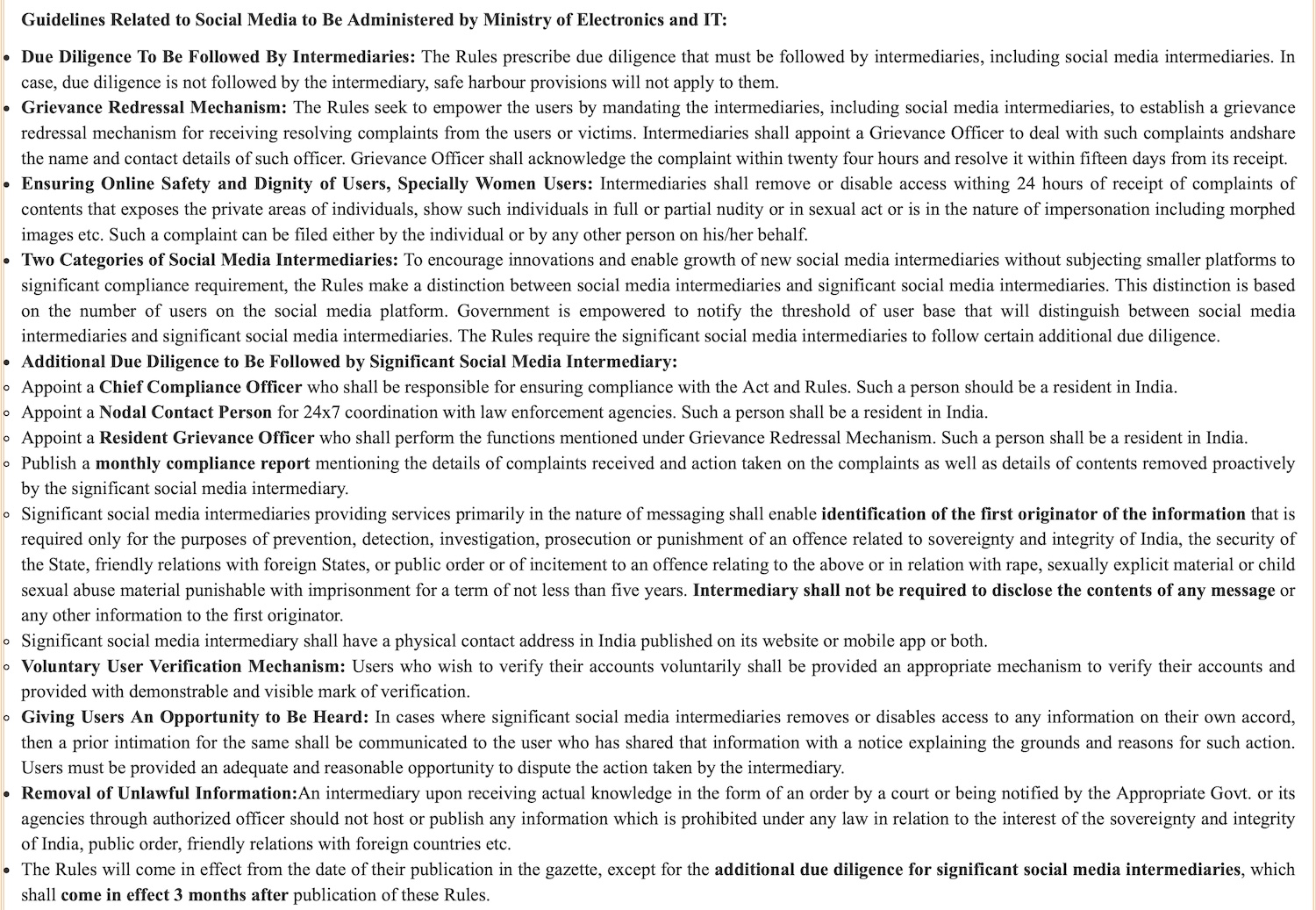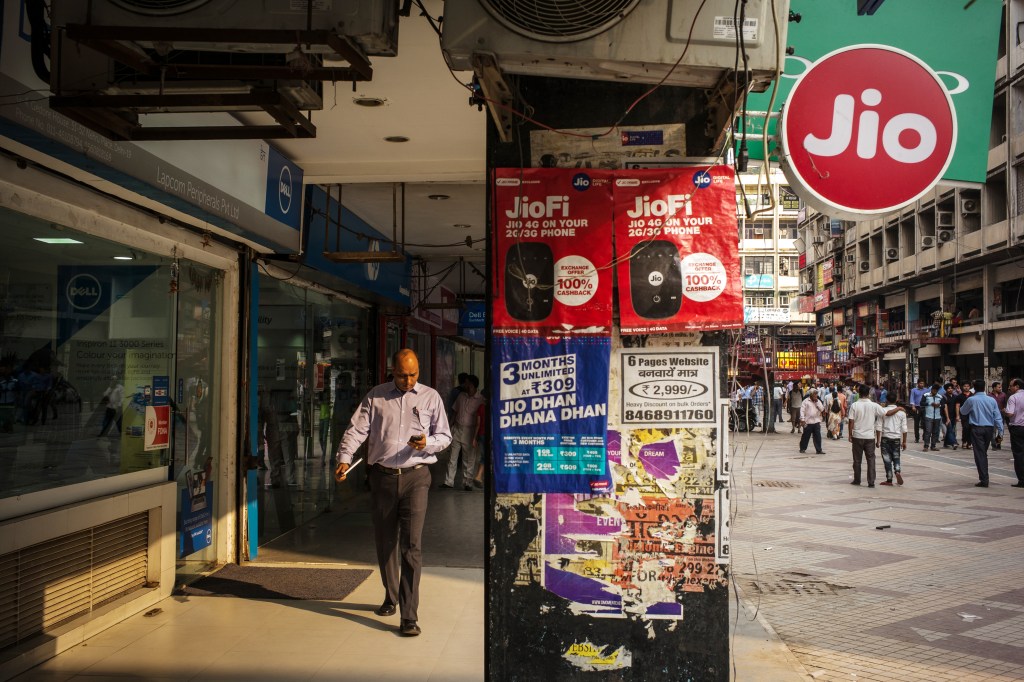India announced sweeping rules to regulate social media firms, streaming services and digital news outlets on Thursday, posing new challenges for giants such as Facebook, Twitter, Google and Netflix that count Asia’s third-largest economy as their key overseas market.
Ravi Shankar Prasad, India’s IT, Law and Justice minister, said in a press conference that social media companies will be required to acknowledge takedown requests of unlawful, misinformation and violent content within 24 hours and deliver a complete redressal within 15 days. In sensitive cases such as those surrounding explicit sexual content, firms will be required to take down the content within 24 hours.
These firms will also be required to appoint compliance, nodal contact and resident grievance officers whose names and contact details will be shared with New Delhi to effectively address on-ground concerns. Firms will also have to set up a local office in India.
The new rules, which have been in the works since 2018, come weeks after Twitter declined to comply with some of New Delhi’s orders amid a protest by farmers in the capital city. The government said at the time that Twitter couldn’t act as the judge or justify non-compliance.
Twitter suspends over 500 accounts in India after government warning
Prasad said today social media firms will have to disclose the originator of objectionable content. “We don’t want to know the content, but firms need to be able to tell who was the first person who began spreading misinformation or other objectionable content,” he said. WhatsApp has previously said that it can’t comply with such traceability requests without compromising end-to-end encryption security for every user.
Firms will also be required to publish a monthly compliance report to disclose the number of requests they have received and specify the actions they took. They will also be required to offer a voluntary option to users who wish to verify their accounts.
The new rules, which replace the law from 2011, go into effect for small firms effective immediately, but “significant” services will be provided three months to comply after the date of notification — which will be “very soon,” said Prasad.
New Delhi has put together these guidelines because citizens in India have long requested a “mechanism to address grievances,” said Prasad. India has been working on a law aimed at intermediaries since 2018 and in the past year, broadened its scope to cover streaming services and online news publications. You can read the final version of the draft here.
“India is the world’s largest open Internet society and the Government welcomes social media companies to operate in India, do business and also earn profits. However, they will have to be accountable to the Constitution and laws of India,” he said.
India emerged as a key battleground for American and Chinese firms in the past decade as Google, Facebook and others rushed to find their next billion users. But in recent years, Prime Minister Narendra Modi’s government has enforced or proposed several rules that impact American firms. Last year, India also banned more than 200 Chinese apps, including ByteDance’s TikTok, citing cybersecurity concerns.
Prasad said WhatsApp had amassed 530 million users in India, its biggest market. YouTube had 448 million users, Facebook’s marquee service 410 million users, Instagram 210 million users and Twitter, 17.5 million users in the country, he said.
Facebook said it was studying the new rules. Netflix declined to comment.

“The mandates in the new rules would result in encouraging internet platforms to over-censor content, require dangerous unproven AI-based content regulation tools, retain vast amounts of user data for handing over to the government, and undermine end-to-end encryption crucial for cybersecurity and individual privacy,” wrote Raman Jit Singh Chima, Asia Pacific Policy Director at Access Now.
For streaming platforms, the rules have outlined a three-tier structure for “observance and adherence to the code.” Until now, on-demand services such as Netflix, Disney+ Hotstar and MX Player have operated in India without having to censor much of their catalogs.
India’s broadcasting ministry to regulate streaming services and online content
New Delhi last year said India’s broadcasting ministry, which regulates content on TV, will also be overseeing digital streaming platforms moving forward. In response, 17 popular streaming firms, including international giants, had banded together last year to devise a self-regulation code. Prakash Javadekar, Minister of Information and Broadcasting, said in the conference that the proposed solution from the industry wasn’t adequate and there will be an oversight mechanism from the government to ensure full compliance with the code.
Streaming services will also have to attach a content rating to their titles. “The OTT platforms, called as the publishers of online curated content in the rules, would self-classify the content into five age-based categories: U (Universal), U/A 7+, U/A 13+, U/A 16+, and A (Adult). Platforms would be required to implement parental locks for content classified as U/A 13+ or higher, and reliable age verification mechanisms for content classified as “A”,” the Indian government said.
“The publisher of online curated content shall prominently display the classification rating specific to each content or programme together with a content descriptor informing the user about the nature of the content, and advising on viewer description (if applicable) at the beginning of every programme enabling the user to make an informed decision, prior to watching the programme.”
Javadekar has done no public consultation for regulating streaming services. A self regulatory code already exsits for streaming services.
Govt doesn't have the legal basis for streaming services regulation. They can't do online content regulation under IT act or cable& tv act.
— Nikhil Pahwa (@nixxin) February 25, 2021
Industry executives have expressed concerns over the new proposed regulation, saying New Delhi hasn’t consulted them for these changes. IAMAI, a powerful industry body that represents nearly all on-demand streaming services in India, said it was “dismayed” by the guidelines, and hoped to have a dialogue with the government.
Facebook to restore news sharing in Australia after government amends proposed law
At the press conference, Javadekar and Prasad were asked if there will be any consultation with the industry The ministers said that they had already received enough input from the industry.
India’s move today comes as several governments around the world are closely examining the impact of technology firms on their citizens and local industries. Facebook this week reached an agreement with the Australian government to restore news pages on its platform after a disagreement over payment to news publishers last week. Australian Prime Minister Scott Morrison reached out to Modi last week to explore ways to prevent the social media company from “bullying” governments.
When asked if India had any thoughts on Australia’s decision, Javadekar said it was not the appropriate day to address that subject.
Correction: An earlier version of the story mistakenly said that the new rules also require media houses to disclose their ownership and reach. We regret the error.































Comment